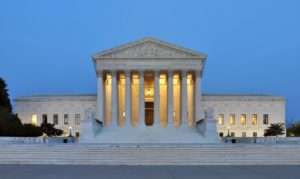The Volokh Conspiracy
Mostly law professors | Sometimes contrarian | Often libertarian | Always independent
Supreme Court Oral Argument Indicates "Radical Agreement" that there is no "Legislative Exception" to the Takings Clause
That's the big takeaway from yesterday's oral argument in Sheetz v. County of El Dorado. But it's not clear whether the Court will resolve any additional issues, and if so how.

Yesterday, the Supreme Court heard oral argument in Sheetz v. County of El Dorado, an important Takings Clause property rights case. When the Supreme Court decided to take the case, most observers (myself included) thought the main issue would be whether there is a "legislative exception" to takings liability in at least some situations where the Fifth Amendment otherwise requires the government to pay "just compensation." In Nollan v. California Coastal Commission, Dolan v. City of Tigard, and other cases, the Supreme Court previously ruled that state and local governments sometimes violate the Takings Clause when they impose exactions as a condition of letting property owners develop their land. Some lower courts—including the California Court of Appeal in this case—have held there is no Takings Clause liability for land-use exactions in cases where the requirement was imposed by legislation, rather than by executive officials or regulatory agencies.
In Sheetz, a property owner had been barred by the County from building a single-family home on his property unless he first paid a $23,420 "traffic impact mitigation" fee. The official question presented by the case is this:
Whether a building-permit exaction is exempt from the unconstitutional-conditions doctrine as applied in Nollan v. California Coastal Commission and Dolan v. City of Tigard, Oregon simply because it is authorized by legislation.
If yesterday's oral argument is any indication, the Supreme Court won't have any trouble concluding the answer is "no." All or nearly all of the justices seem to agree there is no legislative exception. Indeed, even counsel for the County of El Dorado agreed.
In answer to a question by Justice Thomas, she stated that the answer to the question of whether a permit condition qualifies as a taking cannot be answered "by looking at whether there is some sort of legislation." Chief Justice John Roberts immediately noted that her "answer to the question presented is, I think, the same as the Petitioner [the property owner]."
Justice Neil Gorsuch later said he "thought we had taken the case address [the] question of whether Nollan and Dolan simply [do not] apply to legislative enactments of any kind," but oral argument revealed there is "radical agreement" on that issue. Gorsuch is a conservative justice and strong advocate of constitutional property rights. But liberal Justice Elena Kagan similarly stated there "there is radical agreement…. that you don't get a pass from unconstitutional conditions analysis just because you've passed generally applicable legislation. And that's, of course, true in unconstitutional conditions analysis generally, and so too it's true of unconstitutional conditions analysis in the property area."
With such unaccustomed consensus between the justices and the parties to the case, I think it overwhelmingly likely the Court will rule there is no such thing as a "legislative exception" to takings liability. The justices may even be unanimous on that issue (though I am not entirely sure Justice Sotomayor will agree, so they may not). For reasons summarized here, I think this resounding rejection of the legislative exception theory will be the right result.
That, however, still leaves the difficult question of what kinds of regulatory fees qualify as takings, and which do not. Over the course of the oral argument, the justices struggled with this issue. It's hard to tell what they will say if they try to resolve it, and how broad the resulting ruling will be.
A number of questions focused on the issue of whether tolls and user fees qualify as takings if the property owner prevails. I think the answer is "no," because there is a crucial distinction between the government charging a fee for the use of public property (such as a highway), and charging a fee in exchange for letting the owner use his or her own property, as in this case, where Sheetz must pay a large sum just to be able to build a house on his own land. Some justices also raised the perennial issue of how to distinguish takings from property taxes.
The Court could avoid these problems entirely by limiting its holding to the legislative exception issue (which, after all, was the focus of the official question presented), and remanding the rest to the lower courts. Gorsuch and Thomas appeared to want to do just that. But I don't know if there are three other justices who will go along with that approach. If not, it's hard to predict how much further the Court will go with its holding and what it will say.
For more analysis of the Sheetz oral argument, check out posts by Robert Thomas at Inverse Condemnation, and Tim Mulvaney at PropertyProfblog. Mulvaney has helpful additional details on what the Court might do if they decide to go beyond simply rejecting the legislative exception theory.
NOTE: The property owner is represented by the Pacific Legal Foundation, which is also my wife's employer. However, she is not part of the litigation team working on the case.


Show Comments (64)